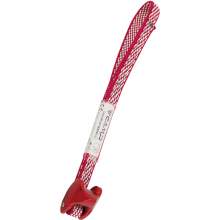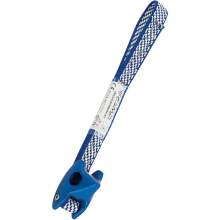Details of using Tricams and advantages of using Tricams.
Dyneema 1.5
Description
By popular demand, the most popular Tricam sizes are also available with Dyneema® slings. These are slightly stronger in camming mode without adding any additional weight and realize the unique benefits of Dyneema®. Compared to nylon, Dyneema® maintains a higher breaking strength when wet and its natural hydrophobic properties prevent the slings from soaking up water and icing over. Sizes: 0.5, 1.0, 1.5, 2.0.
Retail price
When you click a link below and then checkout online, no matter what you buy (climbing gear or not), we get a small commission that helps us keep this site up-to-date. Thanks!
| Weight (grams / ounces) | 49 g / 1.70 oz |
| Size | 1.5 |
| Sling Material(s) | Dyneema |
| Color | Brown |
| Range (inches / millimeters) | 1.02 in - 1.57 in 26.00 mm - 40.00 mm |
| Strength (kilonewtons) | Cam: 20 kN Chock: 17 kN 3Chock: 0 kN |
| Certification | CE, UIAA |
No reviews yet.
CAMP has some really great, versatile, rock protection that you can add to your rack for not a lot of money and not a lot of weight. It has made our climbing more fun and safe, and frankly made it possible to get up the Finger of Fate, which I don’t think would have been possible otherwise.
Designed by Greg Lowe in the 1970s, Tricams first appeared on racks in the early 1980s. While the original unit had two placements (one passive, one active), the newest generation (CAMP Tricam EVO) has three: a cam, a nut, and a nut in broadside-out mode. The biggest benefit? The Tricam often fits where nothing else will, such as horizontal cracks, solution holes, pockets, pods, and flares large enough to require a cam-sized piece, but too narrow for a typical SLCD. See all the placement options and tips when you read the full article.





